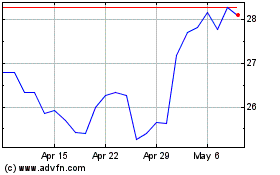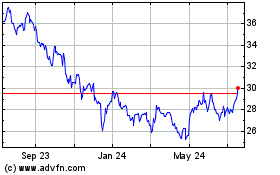EU Orders Extra Pfizer Vaccines Amid J&J Suspension -- Update
April 14 2021 - 12:12PM
Dow Jones News
By Daniel Michaels and Bojan Pancevski
The European Union, grappling with the potential loss of Johnson
& Johnson Covid-19 vaccines, will buy an additional 50 million
doses from BioNTech and Pfizer Inc. for the quarter, and is in
talks to purchase up to 1.8 billion more doses over the next two
years.
The plan marks a vote of confidence in the BioNTech-Pfizer
vaccine, amid rising issues around the AstraZeneca PLC and J&J
alternatives. In shaping the requirements for its new contract, the
EU focused only on vaccines using new messenger-RNA technology,
like those from BioNTech and Pfizer and Moderna Inc. The
AstraZeneca and J&J vaccines use a different technology, known
as viral vector. Production of these shots has proven difficult to
scale up, and there are concerns about possible links to rare blood
clots.
European Commission President Ursula von der Leyen said the new
order would bring total deliveries of the BioNTech-Pfizer vaccine
for the quarter to 250 million doses. The EU also expects 35
million doses from Moderna and 70 million doses from AstraZeneca
during that period.
J&J had been expected to deliver 55 million doses during the
quarter, but that is in question after the company said this week
it would delay the rollout of its vaccine in Europe due to
potential safety concerns.
Similar worries about AstraZeneca's vaccine have prompted
countries in Europe and elsewhere to restrict its use to older
people, and Denmark on Wednesday said it was suspending
indefinitely use of the vaccine. Clotting concerns linked to
Moderna's vaccine have also arisen, but no country has limited its
use.
The EU's new BioNTech-Pfizer order comes as vaccinations in the
bloc are accelerating. J&J's vaccine requires only one shot,
compared with two shots for all the others, so its deliveries had
represented an even larger proportion of total effective
vaccinations. Before Wednesday's announcement, the J&J shots
had accounted for between 15% and 25% of current-quarter
vaccinations.
BioNTech and Pfizer have said that they have capacity to make
2.5 billion doses this year, of which 1.4 billion have already been
ordered. The companies and the EU are in talks for further
deliveries this year, in addition to those announced Wednesday.
This comes after the EU announced in January plans to double its
BioNTech-Pfizer order for this year to 600 million doses.
The EU's 27 member countries, with a combined population of
roughly 450 million people, have administered 100 million vaccine
doses so far, according to Ms. von der Leyen. Of these, more than
one-quarter are second doses, meaning over 25 million Europeans are
fully vaccinated.
The European Commission -- the EU's executive arm that is
handling its coronavirus vaccine purchases -- is trying to prepare
for future waves and mutations in the virus and the need for likely
booster shots. It wants to order 900 million Pfizer-BioNTech doses,
plus options on another 900 million doses, for delivery in 2022 and
2023, an EU official said.
BioNTech confirmed it was in talks with the commission regarding
the order. Additional contracts with other vaccine producers may
follow, Ms. von der Leyen said.
The negotiations represent an effort by the commission to better
prepare and organize vaccine purchases than it did at the height of
the pandemic. The commission and EU countries have faced criticism
for moving too slowly to order vaccines, not investing enough to
develop them and to secure orders, not writing sufficiently binding
contracts and favoring older vaccine technologies over new
ones.
"To prepare for the future, we are drawing lessons from the
first phase of our answer to the pandemic," Ms. von der Leyen
said.
The commission is also insisting that its follow-on contract be
produced at plants in the EU, according to specified monthly
targets. BioNTech has opened a new factory in Germany with capacity
to produce 1 billion doses annually. The company is working to
increase that capacity in the coming months.
Under the contracts that are being negotiated, BioNTech and
Pfizer will be obliged to upgrade their vaccine free of charge to
cover any potential mutations that could render their shots less
effective, according to a person familiar with the talks.
Bulgarian Prime Minister Boyko Borissov recently said the future
doses would cost the EU 19.50 euros each, equivalent to around
$23.30, significantly more than what it is paying for current
doses. A person familiar with the talks confirmed the new
price.
BioNTech co-founder Ugur Sahin said earlier this year that his
company could create a new vaccine to tackle any new variant of the
coronavirus within six weeks.
BioNTech and Pfizer are currently running a study of an upgraded
version of their vaccine design to tackle the South African virus
mutation. This study is coordinated with the European Medicines
Agency, and if it is deemed successful, the regulator is expected
to accept every new upgrade without demanding renewed large-scale
trials, much like it does with anti-flu shots that are upgraded
every season.
Write to Daniel Michaels at daniel.michaels@wsj.com and Bojan
Pancevski at bojan.pancevski@wsj.com
(END) Dow Jones Newswires
April 14, 2021 11:57 ET (15:57 GMT)
Copyright (c) 2021 Dow Jones & Company, Inc.
Pfizer (NYSE:PFE)
Historical Stock Chart
From Mar 2024 to Apr 2024

Pfizer (NYSE:PFE)
Historical Stock Chart
From Apr 2023 to Apr 2024
